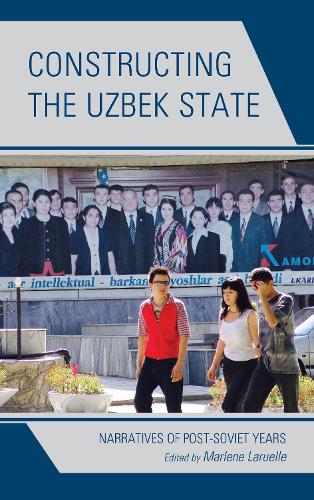
Constructing the Uzbek State: Narratives of Post-Soviet Years
(Hardback)
Publishing Details
Constructing the Uzbek State: Narratives of Post-Soviet Years
By (Author) Marlene Laruelle
Contributions by Sergey Abashin
Contributions by Peter Finke
Contributions by Matteo Fumagalli
Contributions by Alisher Ilkhamov
Contributions by Marlene Laruelle
Contributions by Morgan Y. Liu
Contributions by Maria Louw
Contributions by Nick Megoran
Contributions by Svetlana Peshkova
Bloomsbury Publishing PLC
Lexington Books
20th December 2017
United States
Classifications
Professional and Scholarly
Non Fiction
Geopolitics
Cultural studies
Political economy
958.7086
Physical Properties
Hardback
384
Width 159mm, Height 237mm, Spine 29mm
671g
Description
Over the past three decades, Uzbekistan has attracted the attention of the academic and policy communities because of its geostrategic importance, its critical role in shaping or unshaping Central Asia as a region, its economic and trade potential, and its demographic weight: every other Central Asian being Uzbek, Uzbekistans political, social, and cultural evolutions largely exemplify the transformations of the region as a whole. And yet, more than 25 years after the collapse of the Soviet Union, evaluating Uzbekistans post-Soviet transformation remains complicated. Practitioners and scholars have seen access to sources, data, and fieldwork progressively restricted since the early 2000s. The death of President Islam Karimov, in power for a quarter of century, in late 2016, reopened the future of the country, offering it more room for evolution. To better grasp the challenges facing post-Karimov Uzbekistan, this volume reviews nearly three decades of independence. In the first part, it discusses the political construct of Uzbekistan under Karimov, based on the delineation between the state, the elite, and the people, and the tight links between politics and economy. The second section of the volume delves into the social and cultural changes related to labor migration and one specific trigger the difficulties to reform agriculture. The third part explores the place of religion in Uzbekistan, both at the state level and in society, while the last part looks at the renegotiation of collective identities.
Reviews
This is an excellent book, one that examines the most pressing issues in contemporary Uzbekistan Combining insights from a rare mix of top specialists, this very readable volume takes a penetrating look into Uzbekistans society, culture, and politics. A country with enormous possibility, yet burdened by deep-seated challenges, Uzbekistan highlights the truly multifaceted nature of building a state in this part of the world. Covering migration, economic reform, security threats, and how gender, religion, and culture define Uzbekistans rich social fabric, Constructing the Uzbek State is essential reading for anyone interested in this important country. -- Lawrence P. Markowitz, Rowan University
This tour de force of contemporary scholarship on Uzbekistan is as insightful as it is timely. In 2016 the first president of Uzbekistan died after twenty-five years of stern rule and was replaced by a successor who immediately proposed small but significant changes. The analysis in this book will be invaluable to those who want to engage with the opportunities that may arise from new openings in one of the most closed countries in the world. This is the only book on Uzbekistan that has brought together top academic experts who speak the local languages and have lived in and studied the region for many years. The result is a rich and nuanced picture of Uzbekistans political, economic, and social life in the early twenty-first century that is accessible to students and policymakers alike. -- Laura Adams, Institute for International Education, author of The Spectacular State: Culture and National Identity in Uzbekistan
Author Bio
Marlene Laruelle is research professor, director of the Central Asia Program, and associate director of the Institute for European, Russian, and Eurasian Studies (IERES) at the Elliott School of International Affairs of George Washington University.
